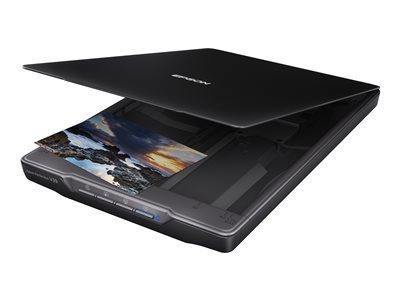Whether you’re in the office or at home, you can’t transfer photos and documents with clarity to your computer or a USB drive without a flatbed scanner.
After many hours of research, I’ve made a selection of the best flatbed scanners you can currently find on the market.
List of the Best Flatbed Scanners:
- Doxie Flip – Best Overall Flatbed Scanner
- Epson Perfection V550 – Best Flatbed Photo Scanner
- Canon CanoScan Lide 400 – Lightweight Flatbed Scanner
- Epson Perfection V600 – Best for 35mm Slides & Film
- Plustek A3 – Best for Art & Photographs
Our Top Picks
Printer | Scan Resolution (DPI) | Scan Speed (PPM) | Weight (Pounds) |
|---|---|---|---|
Doxie Flip | 600 | 9 | 1.3 |
Epson Perfection V550 | 6400 | N/A | 9.6 |
Canon CanoScan Lide 400 | 4800 | 8 | 3.6 |
Epson Perfection V600 | 6400 | N/A | 9 |
Plustek A3 | 1200 | 9 | 9.5 |
The 5 Best Flatbed Scanners in 2020
1. Doxie Flip – Best Overall Flatbed Scanner
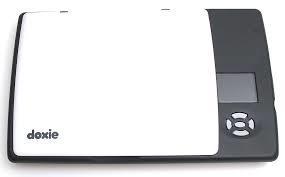
This battery-powered scanner comes with a transparent scanning area of 4 x 6 inches.
Its portable and flexible design enables it to be flipped over to capture 600 DPI scans directly on top of any document, sketch, or various items. You can then save them to an SD card for standalone operations.
You can operate your Doxie Flip wirelessly on 4 AA batteries as well as detach the lid for the maximum versatility.
Moreover, in only 7 seconds, the Flip can complete a 300-DPI scan. It can also run 200 scans before it needs a battery replacement.
Additionally, there’s an included software that allows you to stitch together a larger document.
With the Doxie Flip, you’ll find the companion software, four pre-installed AA batteries, a 4 GB SD card, and a USB SD card reader.
Pros:
- Highly portable with a compact design
- Completely cordless
- Can work without a computer and save directly to an SD card
- Equipped with AA batteries
Cons:
- Limited document scanning size
- Battery life is not very effective
Bottom line:
The Doxie Flip comes with application software and battery power, which is quite the improvement upon previous products. Its portability makes it an excellent option for people who want to scan on the go as it can upload files directly to the cloud www.modernpropertysolutions.com/.
2. Epson Perfection V550 – Best Flatbed Photo Scanner
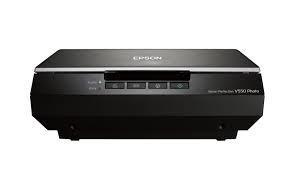


Featuring a 6400 DPI sensor that’s capable of scanning 35mm negatives, slides, and medium format film, this scanner enables you to digitize your negatives to view, edit, and share them later.
Moreover, the 48-bit color depth and 3.4 Dmax help you reach more accurate color rendition.
Additionally, you’ll find film holders that guarantee precise scans from the first attempt and which also separate multiple frames into separate files.
After you’ve scanned an image, you can upload it directly to any cloud-enabled service using the included Epson Easy Photo Scan software.
A very remarkable feature on the Epson Perfection V550 is the OCR (optical character recognition) software. zakłady bukmacherskie piłka nożna
OCR allows you to create a PDF file that you can edit to make archiving and sharing a breeze.
On top of that, you can program each of the scanner’s four one-touch buttons to automatically perform a specific type of scan that you frequently use.
Pros:
- High-quality scans for an affordable price
- Can scan prints, negatives, slides, and medium-format film
- Direct upload to cloud-based services
Cons:
- Doesn’t come with a photo-editing program
- Not suitable for scanning documents
Bottom line:
If you’re going to be scanning film and photos more than documents, then the Epson Perfection V550 is the ideal choice for you.
3. Canon CanoScan Lide 400 – Lightweight Flatbed Scanner
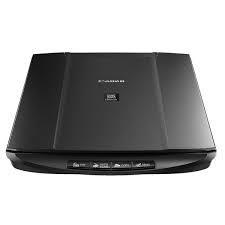


With the Canon CanoScan Lide 400, you can easily and quickly scan a document in high 4800 DPI resolution that can be interpolated to reach 19200 DPI.
This lightweight scanner comes with flatbed CIS scanner which can scan high-resolution pages at an 8 PPM rate and scan documents up to 11.7 inches in size.
The Advanced Z-lid Expansion Top and 5 EZ buttons allow you to operate your scanner with a push of a button.
The Canon CanoScan Lide 400 is more of a flatbed scanner for windows as the windows-exclusive bundled software can correct scanned images for dust, scratches, or other issues.
On top of that, it also features a “Send to Cloud” option which enables you to quickly upload your media to cloud storage services such as Dropbox or Microsoft OneDrive.
Pros:
- Amazing photo scans
- Superb software bundle
- Easy to use
- Can stand upright with the kickstand
Cons:
- Doesn’t support many mobile devices or wireless networking
- Some inaccuracies scanning serif fonts
Bottom line:
The entry-level flatbed CanoScan Lide 400 gives you great value for your money -especially with its fantastic software bundle that makes the scanning process more manageable.
4. Epson Perfection V600 – Best for 35mm Slides & Film
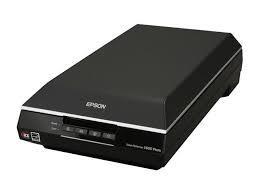


If you’re looking for a solution to convert 35mm and medium-format slides, film, and prints into high-resolution digital files, the Epson Perfection V600 won’t disappoint you.
It has a 6400 DPI when the user makes 17 x 22-inch enlargements.
Moreover, it comes with a built-in transparency unit that enables the user to scan four 35mm mounted slides or 12 negatives.
The Epson Perfection V600 lets you work with a medium-format film of up to 6 x 22cm as well as photo documents of up to 8.5 x 11.7 inches.
Epson’s ReadyScan LED technology makes the scanner energy-efficient as it enables the unit to operate without needing a warm-up before. This means you’ll get faster scans with lower power consumption.
You can assign different functions to the four customizable buttons to control the Epson Perfection V600 more efficiently and seamlessly.
The Digital Ice technology for scratch and dust removal is part of the bundle that helps create a crisp, clear, and accurate digital output. You also get ArcSoft PhotoStudio for image improvement, and Easy Photo Fix to restore faded images.
Pros:
- Good scan quality
- Capable of scanning photos and film negatives
- Great OCR results
- Digital ICE dust removal
Cons:
- Prints long documents very slowly
- Lacks native text recognition
Bottom line:
Although the Epson Perfection V600 produces very accurate photo scans, you can find models that give you better photo enhancement which makes the final result look better.
5. Plustek A3 – Best for Art & Photographs
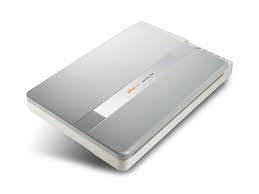


The tabloid-size 12 x 17-inch Plustek A3 Flatbed Scanner OS is great for art, photographs, scrapbooks, documents, newspapers, and more.
Combining a resolution of 1200 DPI and a color scan speed of 15 seconds, it produces an internal color depth of 48 bits to reach the most accurate color reproduction.
It’s a work beast as it’s designed with a duty cycle of 2,500 pages daily. darmowe gry kasyno bez logowania
Pros:
- Affordable price
- Capable of creating presets
- Large, wide-format scanning surface
- Superb OCR
Cons:
- Basic software
- Subpar color accuracy
Bottom line:
The Plustek A3 is one of the best flatbed scanners that performs impressively well. If you’re on a tighter budget, it’s your best choice.
How to Pick a Flatbed Scanner
Speed
While faster scanners will cost you more, you can’t do without them if you’re going to work with large volumes.
Duplexing
Two-sided scanning in a single pass can save you a lot of time and possibly some money.
Maximum Paper Size
From standard letter size (8.5 x 11 inches) and legal (8.5 x 14 inches) to larger tabloid sizes (11 x 17 inches). So before you get your scanner, you should know the size of documents you’ll be dealing with.
Resolution
A scanner’s resolution is measured in DPI (Dots per Inch).
A 600 DPI one is fine, but if you’re going to be working with photographs, you should go for at least 1200 DPI.
Software Capabilities
Optical recognition software can transform your scanned documents into Word or text files that you can later edit –an amazingly helpful feature.
Flatbed Scanners Vs. Sheet-Fed Scanners
Flatbed Scanners
Flatbeds are suitable for scanning either photographs or documents, so they’re quite versatile.
Moreover, flatbed scanners provide you with the highest resolutions and are packed with features, which explains why they tend to have a bigger footprint.
Another downside is the fact that they can only work with one document at a time, so they’re not the most time-efficient or suitable for large-volume scans.
Sheet-Fed Scanners
Sheet-fed scanners are your best bet when it comes to large-volume office scanning.
Unlike flatbeds, sheet-fed ones can execute continuous scans.
They’re also faster and capable of duplex scanning. However, their resolution isn’t top-notch. zakłady sportowe legalne
How Does A Flatbed Scanner Work?
Basically, a moving belt slides a light source across the surface of the document once you close the lid.
It lights up the whole surface to expose the document to light uniformly. After that, the light is reflected into the machine and onto the lens by a series of mirrors.
Shades of light, then, are turned into digital information to be located all over the final document.
Final Words
While the factors for judging which is the best flatbed scanner on the market may vary, there are ones that you simply can’t go wrong with.
TheCanon CanoScan Lide 300 is the most affordable choice and which has a sufficient scanning speed and resolution. So it gives you the biggest bang for your buck.
On the other hand, the Epson Perfection V600 has the best scan resolution as combines great OCR results and superb digital ICE dust removal.
